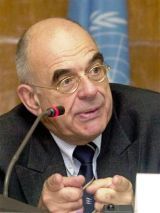Sudan orders top UN envoy to leave
Oct 22, 2006 (KHARTOUM) — Sudan on Sunday ordered the top U.N. envoy, Jan Pronk, to leave the country within three days following comments he made that the army’s morale was low after suffering two major defeats in the violent Darfur region.
 Foreign Ministry spokesman Ali al-Sadig said Pronk had until mid-day Wednesday to leave.
Foreign Ministry spokesman Ali al-Sadig said Pronk had until mid-day Wednesday to leave.
“The reason is the latest statements issued by Mr. Pronk on his Web site regarding severe criticism of the Sudanese Armed Forces and the fact that he said the government of Sudan is not implementing the Darfur peace agreement,” al-Sadig added.
He said the Foreign Ministry met with Pronk on Sunday and had informed him of its decision.
Pronk has previously had problems with the government because of comments he published on his Web log www.janpronk.nl. The latest blog entry said Darfur rebels had beaten the army in two major battles in the last two months.
He said generals had been sacked, morale was low and soldiers were refusing to fight in North Darfur. The army was furious and issued a statement on Friday calling Pronk a danger to the nation’s security.
One army source said they were asking President Omar Hassan al-Bashir, the commander-in-chief of the army, to expel Pronk.
Al-Sadig said rebels would consider Pronk’s comments as encouragement to continue their military campaign.
Pronk’s spokeswoman declined comment. U.N. officials in New York were not immediately available to react to the decision.
But Khalil Ibrahim, a senior member of the rebel National Redemption Front (NRF), told Reuters the decision to expel Pronk did not come from politicians but was a diktat from the army.
“They don’t want to leave any free voices in Sudan. … Jan Pronk was the voice of those suffering in Darfur,” he said.
“GOVERNOR-GENERAL”
Pronk, 66, has been Secretary-General Kofi Annan’s top envoy in Sudan for nearly two years. He was formerly the Dutch minister of environment and development cooperation.
Pronk is known in Sudan for his dedication to his job but also his blunt comments, which irked some parties. Sudanese privately call him the “governor-general” of Khartoum, a reference to the former British colonial ruler.
Ibrahim said although he had conflicts with Pronk, he considered the U.N. official fair and unbiased.
“The government could not bribe him with money or contain him and that is why they want him out,” he added.
Experts say 200,000 people have been killed and 2.5 million forced from their homes since mostly non-Arab rebels took up arms in early 2003 accusing the central government of neglect.
Pro-government militias are accused of a campaign of rape, murder and pillage, which Washington calls genocide.
Rebel commander Jar el-Naby told Reuters from North Darfur that militias had attacked again on Saturday around 100 km (62 miles) northwest of Darfur’s main town of el-Fasher, raping two girls and looting villages.
Khartoum denies genocide but the International Criminal Court is investigating alleged war crimes in the region.
Only one of three negotiating rebel factions signed a May peace accord brokered by the African Union. Many non-signatories formed the new NRF alliance which renewed hostilities with the government in June.
Since the deal, violence has only escalated in Darfur with rebel infighting and NRF clashes with the government. Tens of thousands more have been displaced and dozens of people killed.
The Darfur conflict has spilled over the border into Chad where tens of thousands of civilians have been forced to flee militia attacks from Darfur.
(Reuters)
